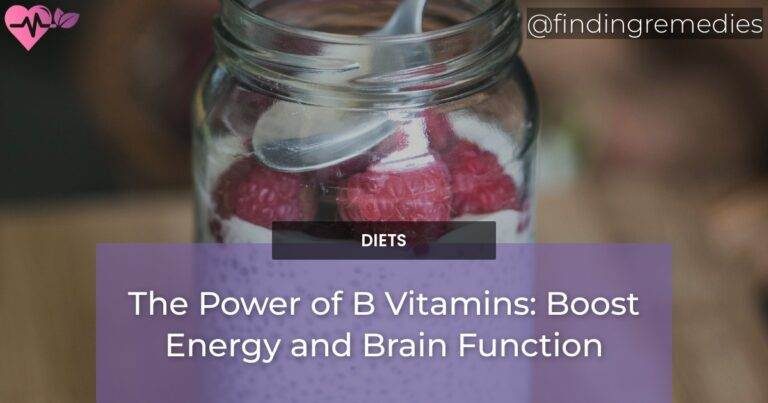B Vitamins: The Basics and Benefits
B vitamins play an essential role in maintaining good health and well-being. They help our bodies convert food into energy, support healthy brain function, and maintain healthy skin and hair. In this article, we will explore the various types of B vitamins, their importance in the nutrition and health care industry, their food sources, benefits, recommended daily intake, and signs of deficiency.
Importance of B Vitamins in Nutrition and Health Care Industry
B vitamins are a group of water-soluble vitamins that are crucial for the proper functioning of our bodies. They help in converting food into energy, which is essential for good health and overall well-being. B vitamins also support brain function, immune system, and cell metabolism. B vitamins are important for maintaining healthy skin, hair, and eyesight.
Functions of B Vitamins
B vitamins have several essential functions in the body, including:
- Helping to form red blood cells
- Aiding in the production of DNA
- Supporting the nervous system
- Helping to metabolize carbohydrates, proteins and fats
Types of B Vitamins and their Food Sources
There are eight B vitamins, each with a unique set of functions and food sources.
Vitamin B1 (Thiamine)
Vitamin B1 helps to convert carbohydrates into energy and is important for the proper functioning of the nervous system. It is found in whole grains, lentils, beans, nuts, and seeds.
ALSO READ
Vitamin B2 (Riboflavin)
Vitamin B2 is important for energy production, healthy skin, and eyesight. It is found in meat, fish, dairy, leafy greens, and fortified foods.
Vitamin B3 (Niacin)
Vitamin B3 helps to lower cholesterol, support brain function, and maintain healthy skin. It is found in meat, fish, poultry, whole grains, and mushrooms.
ALSO READ
Vitamin B5 (Pantothenic Acid)
Vitamin B5 helps to convert food into energy, maintain healthy skin, and support the nervous system. It is found in meat, fish, whole grains, and mushrooms.
Vitamin B6 (Pyridoxine)
Vitamin B6 helps to produce neurotransmitters and is important for brain function. It is found in meat, fish, poultry, bananas, and potatoes.
Vitamin B7 (Biotin)
Vitamin B7 is important for healthy hair, skin, and nails. It is found in eggs, nuts, and seeds.
Vitamin B9 (Folate)
Vitamin B9 is important for the production of DNA and the formation of red blood cells. It is found in leafy greens, legumes, and citrus fruits.
Vitamin B12 (Cobalamin)
Vitamin B12 is important for the proper functioning of the nervous system and the formation of red blood cells. It is found in meat, fish, and poultry.
Benefits of B Vitamins
B vitamins have several benefits for our health and well-being. Some of the benefits include:
Improved energy levels
B vitamins help to convert food into energy, which can improve our energy levels and reduce fatigue.
Healthy brain function
B vitamins are important for the proper functioning of the nervous system and the production of neurotransmitters, which can improve our cognitive function and mood.
Reduced risk of certain health conditions
B vitamins can help reduce the risk of certain health conditions, including heart disease and birth defects.
Healthy skin and hair
B vitamins are essential for healthy skin, hair, and nails. They help to maintain the integrity of our cells and prevent damage from free radicals.
Foods High in B Vitamins
Here are some foods that are high in B vitamins:
- Liver
- Chicken
- Fish
- Eggs
- Leafy greens
- Legumes
- Seeds and nuts
- Fortified grains and cereals
- Avocados
- Bananas
Recommended Daily Intake of B Vitamins
The recommended daily intake of B vitamins varies based on age, gender, and other factors. Here are some general recommendations:
Age and gender-based recommendations
- Vitamin B1: 1.1-1.2 mg/day (adults)
- Vitamin B2: 1.1-1.3 mg/day (adults)
- Vitamin B3: 14-16 mg/day (adults)
- Vitamin B5: 5 mg/day (adults)
- Vitamin B6: 1.3-1.7 mg/day (adults)
- Vitamin B7: 30 mcg/day (adults)
- Vitamin B9: 400-600 mcg/day (adults)
- Vitamin B12: 2.4 mcg/day (adults)
Special considerations
Some people may need higher doses of B vitamins, including pregnant and breastfeeding women, older adults, and people with certain health conditions. Always consult with a healthcare professional before taking any supplements.
Signs of B Vitamin Deficiency
Signs of B vitamin deficiency can vary depending on the type of vitamin and severity of the deficiency. Here are some common symptoms:
- Fatigue and weakness
- Irritability and mood changes
- Poor memory and concentration
- Shortness of breath
- Tingling or numbness in hands and feet
- Headaches
- Cracks at the corners of the mouth
Groups at risk for B vitamin deficiency include older adults, vegans and vegetarians, and people who consume large amounts of alcohol.
Conclusion
B vitamins are essential for maintaining good health and well-being. They play an important role in energy production, brain function, and healthy skin and hair. It’s important to consume a balanced diet rich in B vitamin sources, including whole grains, lentils, beans, nuts, seeds, meat, fish, dairy, leafy greens, and fortified foods. Always consult with a healthcare professional before taking any supplements to ensure you are meeting your B vitamin needs.

